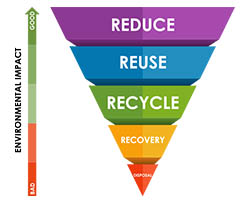18 Aug 2017
Waste… let’s get it sorted

Throughout the working day, staff and students across the University will use one of the many recycling bins across campus and decide which bin is appropriate for the item to be discarded.
But what guides the thinking behind why the bins are separated, and how can we avoid creating waste in the first place?
In order to raise awareness of using the recycling bins correctly, new signage will appear on bins, as well as posters across campus.
The Sustainability team have also issued guidance on the waste hierarchy – the standard framework for how waste should be treated.
It allows the University to meet its legal requirements and manage resources carefully, but importantly to embed sustainability and social responsibility across all of its operations.
Waste contamination, caused by discarding waste incorrectly, means less material can be recycled and therefore more is sent to ever decreasing landfill space.
Reduce, Reuse, Recycle
The waste hierarchy is made up of five sections, ranked top to bottom in order of which has the least negative environmental impact.
- Reduce; looking for ways of reducing waste in day to day activities
- Reuse; considering whether resources can be reused before discarding
- Recycle; ensure materials which can be recycled are segregated avoiding contamination
- Recovery; sending waste for anaerobic digestion or incineration which recovers energy
- Disposal; landfill and incineration with no energy recovery which is detrimental to the environment
There are a number of practical ways all colleagues can help to minimise our impact on the environment. Some examples are as follows:
- Many items can be recycled – 75% of waste, in fact. Guidance on recycling anything from laboratory glass to cooking oil is available here
- The Sustainability team collect unwanted but usable lever Arch files and ring binders and pass these to students for reuse. Please contact waste@lboro.ac.uk if you are having a clear out and require some assistance
- Consider whether other departments might be able to make use of any unwanted items before discarding them – particularly during refurbishments and office moves
- You can reduce waste by asking for crockery with buffets rather than disposables, which mostly cannot be recycled
- Avoid over-ordering when making purchases – buying in bulk can be more economical, but only if it is all used
Further guidance on waste is available on the Sustainability webpages. For additional advice, or if you have any queries or suggestions, please contact Nik Hunt, Environmental Manager on n.o.hunt@lboro.ac.uk or 01509 228083.















